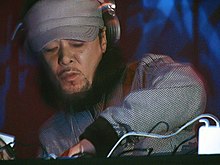DJ Krush
DJ Krush 石 英明 | |
|---|---|
 | |
| Background information | |
| Birth name | Hideaki Ishi |
| Born | July 29, 1962 Tokyo, Japan |
| Genres | Instrumental hip hop, hip hop, trip hop, turntablism |
| Occupation(s) | Record producer, DJ |
| Instrument(s) | Music sequencer, turntable, sampler, mixer |
| Years active | 1985–present |
| Labels | Shadow, Mo' Wax, RED Ink, FFRR |
| Website | www |
Hideaki Ishi (石 英明, Ishi Hideaki, born July 29, 1962), better known by his stage name DJ Krush, is a record producer and DJ. He is known for his atmospheric instrumental production which incorporates sound elements from nature and extensive use of jazz and soul samples.
Early life
Ishi was born in Tokyo in 1962. He dropped out of school at an early age and joined a local gang and, a few years later, the yakuza. Early in his career as a yakuza underling, Ishi discovered a severed finger wrapped in paper on his desk. Later, after discovering that it had belonged to his friend, he decided to leave the yakuza and cut ties with the criminal underworld.[1][2] Ishi was inspired to start DJing after seeing the film Wild Style in 1983.[2][3]
Career
Aside from being considered one of the pioneers of Japanese hip hop,[4] Ishi has established himself as one of the most respected artists and producers in the hip hop industry, both in Japan and abroad. Upon entering the industry, Ishi, with his experimental beats and instrumental sounds, changed the face of hip-hop at a time when it was dominated by the American rap scene. He is reluctant to identify his music with any particular genre, for it would place limits on his listeners and on his talents.[5] He has been regarded as ambient, trip hop, some combination of the two, and hip hop. DJ Krush prefers to exercise an ideological distance from the genres he is usually grouped into, while maintaining a healthy appreciation for all music forms and styles.[6]
Discography
Albums
- Krush (1994)
- Strictly Turntablized (1994)
- Meiso (1995)
- Ki-Oku (1996) (with Toshinori Kondo)
- MiLight (1996)
- Kakusei (1998)
- Ga (1999) (with DJ Hide and DJ Sak, as Ryu)
- Zen (2001)
- The Message at the Depth (2002)
- Jaku (2004)
- Butterfly Effect (2015)
EPs
- Bad Brothers (1994) (with Ronny Jordan)
- The DJ Krush EP (1995)
- Code 1255 (1999) (with Gravity)
Singles
- "Lost and Found" b/w "Kemuri" (1994) with DJ Shadow)
- "A Whim" b/w "89.9 Megamix" (1995) (with DJ Shadow)
- "Big City Lover" (1995)
- "Dig This Vibe" (1995) (with Roni Size)
- "Meiso" (1995)
- "Headz 2 Sampler" (1996) (with Zimbabwe Legit)
- "Only the Strong Survive" (1996)
- "Milight" (1997)
- "Selektions" (1997)
- "Final Home" (1999)
- "Tragicomic" (2000) (with Aco and Twigy)
- "Never Too Soon" (1999) (with DJ Hide and DJ Sak, as Ryu)
- "Rhythm Asobi" (2000) (with DJ Hide and DJ Sak, as Ryu)
- "Supreme Team" b/w "Alepheuo" (2003)
- "Koufu no Tsubasa: Breathe of Wings" (2011)
- "Kuon: Far and Away" (2011)
- "Shuya no Chiheisen: Sleepless Horizon" (2011)
- "Kagi no Te: Phasic Swing" (2011)
- "Kouro: Optical Path" (2012)
- "Kuroi Ame: Black Rain" (2012)
- "Aoi Ame: Green Rain" (2012)
- "Genun: Passage of Time" (2012)
- "Kyofu: Conflicts" (2012)
- "Yushin: Brave Heart" (2012)
Mixtapes
- Holonic-The Self Megamix (1997)
- Code 4109 (2000)
Compilations
- Cold Krush Cuts (1997) (with DJ Food and Coldcut)
- Reload: The Remix Collection (2001)
- Stepping Stones: The Self Remixed Best: Lyricism (2006)
- Stepping Stones: The Self Remixed Best: Soundscapes (2006)
- OuMuPo 6 (2007)
DVDs
- History of DJ Krush (2007)
Guest appearances
- Monday Michiru - "Cruel 2 Be Kind" from Double Image (1998)
- Luna Sea - "Sweetest Coma Again" and "Kiss" from Lunacy (2000)
- Ryuichi Sakamoto - "Zero Landmine" from Zero Landmine (2001)
- Yasushi Ide - "Black Night" (2006)
Remixes
- Naniwa Man - "L.O.V.E. '95" (1995)
- k.d. lang - "Sexuality" (1995)
- DJ Vadim - "Variations in U.S.S.R." from U.S.S.R. Reconstruction: Theories Explained (1997)
- Miki Nakatani - "Wilder than Heaven" from Vague (1997)
- Inoran - "Rat Race" from Sou (1997)
- Sugizo - "Eternity in Luna" from Replicant Truth? (1997)
- Boom Boom Satellites - "On the Painted Desert" from On The Painted Desert - Rampant Colors (1999)
- Aco - "Aishu to Ballad" from The Other Side of Absolute Ego (2000)
- Dragon Ash - "Deep Impact" (2000)
- Boredoms - Rebore, vol. 3 (2001)
- Tetsuya Komuro - "Blue Fantasy Remix" (2002)
Compilation appearances
- "Only the Strong Survive" and "A Whim" on The Story of Mo'Wax (1995)
- "Shin-Ki-Row" on Altered Beats: Assassin Knowledges of the Remanipulated (1996)
- "Ryu-Ki" on Offbeat: A Red Hot Soundtrip (1996)
References
- ^ Fuller, Thomas (2002-01-18). "DJ Krush Gives the Turntable an Asian Spin - NYTimes.com". International Herald Tribune. Archived from the original on February 25, 2008. Retrieved 2012-05-09.
{{cite web}}: Unknown parameter|deadurl=ignored (|url-status=suggested) (help) - ^ a b Liu, Jeff. "DJ Krush: Kracking the Code". Retrieved 15 August 2014.
- ^ Song, Berwin (21 December 2011). "DJ Krush interview". Time Out Shanghai. Archived from the original on 19 August 2014. Retrieved 15 August 2014.
{{cite web}}: Unknown parameter|deadurl=ignored (|url-status=suggested) (help) - ^ Condry, Ian. Hip-hop Japan: Rap and the Paths of Cultural Globalization. Durham, North Carolina: Duke University Press, 2006.
- ^ Manabe, Noriko. "Representing Japan: ‘national’ style among Japanese hip-hop DJs." Popular Music, 32, pp 35-50 doi:10.1017/S0261143012000530. [1]
- ^ "Asia Pacific Arts: Krushing Labels". Asiaarts.ucla.edu. Archived from the original on 2013-11-03. Retrieved 2013-05-13.
{{cite web}}: Unknown parameter|deadurl=ignored (|url-status=suggested) (help)
External links
- Official website
- DJ Krush discography at Discogs
